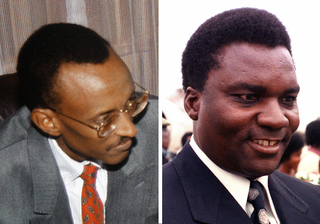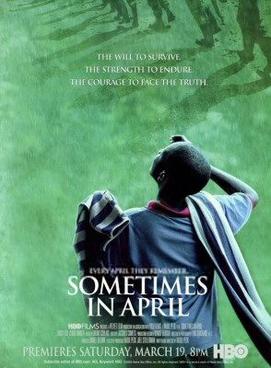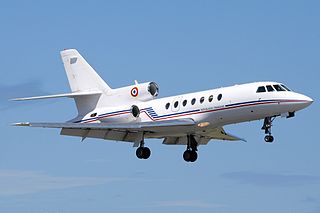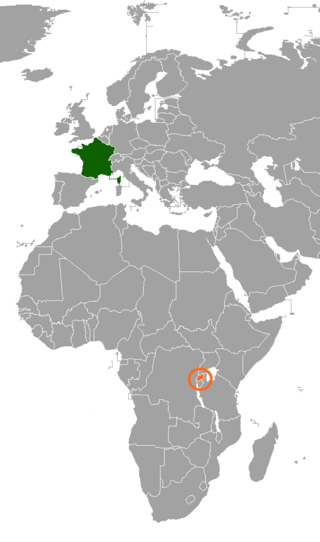Related Research Articles
Human occupation of Rwanda is thought to have begun shortly after the last ice age. By the 11th century, the inhabitants had organized into a number of kingdoms. In the 19th century, Mwami (king) Rwabugiri of the Kingdom of Rwanda conducted a decades-long process of military conquest and administrative consolidation that resulted in the kingdom coming to control most of what is now Rwanda. The colonial powers, Germany and Belgium, allied with the Rwandan court.

Juvénal Habyarimana was a Rwandan politician and military officer who was the second president of Rwanda, from 1973 until his assassination in 1994. He was nicknamed Kinani, a Kinyarwanda word meaning "invincible".

The United Nations Assistance Mission for Rwanda (UNAMIR) was established by United Nations Security Council Resolution 872 on 5 October 1993. It was intended to assist in the implementation of the Arusha Accords, signed on 4 August 1993, which was meant to end the Rwandan Civil War. The mission lasted from October 1993 to March 1996. Its activities were meant to aid the peace process between the Hutu-dominated Rwandese government and the Tutsi-dominated rebel Rwandan Patriotic Front (RPF). The UNAMIR has received much attention for its role in failing, due to the limitations of its rules of engagement, to prevent the Rwandan genocide and outbreak of fighting. Its mandate extended past the RPF overthrow of the government and into the Great Lakes refugee crisis. The mission is thus regarded as a major failure.

The Rwandan genocide, also known as the genocide against the Tutsi, occurred from 7 April to 19 July 1994 during the Rwandan Civil War. Over a span of around 100 days, members of the Tutsi ethnic group, as well as some moderate Hutu and Twa, were systematically killed by Hutu militias. While the Rwandan Constitution states that over 1 million people were killed, most scholarly estimates suggest between 500,000 and 662,000 Tutsi died. The genocide was marked by extreme violence, with victims often murdered by neighbors, and widespread sexual violence, with between 250,000 and 500,000 women raped.
Agathe Uwilingiyimana, sometimes known as Madame Agathe, was a Rwandan political figure. She served as Prime Minister of Rwanda from 18 July 1993 until her assassination on 7 April 1994, during the opening stages of the Rwandan genocide. She was also Rwanda's acting head of state in the hours leading up to her death.

Opération Turquoise was a French-led military operation in Rwanda in 1994 under the mandate of the United Nations. The "multilateral" force consisted of 2,500 troops, 32 from Senegal and the rest French. The equipment included 100 APCs, 10 helicopters, a battery of 120 mm mortars, 4 Jaguar fighter bombers, 8 Mirage fighters, and reconnaissance aircraft. The helicopters laid a trail of food, water and medicine enabling refugees to escape into eastern Zaire. Opération Turquoise is controversial for at least two reasons: accusations that it was an attempt to prop up the genocidal Hutu regime, and that its mandate undermined the UNAMIR. By facilitating 2 million Rwandan refugees to travel to Kivu provinces in Zaire, Turquoise setup the causes of the First Congo War.

The assassination of presidents Juvénal Habyarimana and Cyprien Ntaryamira in the evening of April 6, 1994 was the proximate trigger for the Rwandan genocide, which resulted in the murder of approximately 800,000 Tutsi and a smaller number of moderate Hutu. The first few days following the assassinations included a number of key events that shaped the subsequent course of the genocide. These included: the seizing of power by an interim government directed by the hard-line Akazu clique; the liquidation of opposition Hutu politicians; the implementation of plans to carry out a genocide throughout the country; and the murder of United Nations peacekeepers, contributing to the impulse of the international community to refrain from intervention.
Protais Zigiranyirazo commonly known as Monsieur Zed, is a Rwandan businessman and politician and was governor of the Ruhengeri prefecture in northwestern Rwanda from 1974 to 1989. Zigiranyirazo was a member of the Akazu, an elite circle of relatives and friends of former President Juvénal Habyarimana who pushed the Hutu Power ideology.

The Rwandan Civil War was a large-scale civil war in Rwanda which was fought between the Rwandan Armed Forces, representing the country's government, and the rebel Rwandan Patriotic Front (RPF) from 1 October 1990 to 18 July 1994. The war arose from the long-running dispute between the Hutu and Tutsi groups within the Rwandan population. A 1959–1962 revolution had replaced the Tutsi monarchy with a Hutu-led republic, forcing more than 336,000 Tutsi to seek refuge in neighbouring countries. A group of these refugees in Uganda founded the RPF which, under the leadership of Fred Rwigyema and Paul Kagame, became a battle-ready army by the late 1980s.

Sometimes in April is a 2005 American made-for-television historical drama film about the 1994 Rwandan Genocide, written and directed by the Haitian filmmaker Raoul Peck. The ensemble cast includes Idris Elba, Oris Erhuero, Carole Karemera, and Debra Winger.

The Akazu was an informal organization of Hutu extremists whose members contributed strongly to the 1994 Rwandan genocide. A circle of relatives and close friends of Rwanda's then-president Juvénal Habyarimana and his influential wife Agathe Habyarimana, they were also called the Zero Network, for their goal of a Rwanda with zero Tutsi.

Kangura was a Kinyarwanda and French-language magazine in Rwanda that served to stoke ethnic hatred in the run-up to the Rwandan genocide. The magazine was established in 1990, following the invasion of the rebel Rwandan Patriotic Front (RPF), and continued publishing up to the genocide. Edited by Hassan Ngeze, the magazine was a response to the RPF-sponsored Kanguka, adopting a similar informal style. "Kangura" was a Rwandan word meaning "wake others up", as opposed to "Kanguka", which meant "wake up". The journal was based in Gisenyi.

On the evening of 6 April 1994, the aircraft carrying Rwandan president Juvénal Habyarimana and Burundian president Cyprien Ntaryamira, both Hutu, was shot down with surface-to-air missiles as their jet prepared to land in Kigali, Rwanda; both were killed. The assassination set in motion the Rwandan genocide, one of the bloodiest events of the late 20th century.
Hutu Power is an ethnic supremacist ideology that asserts the ethnic superiority of Hutu, often in the context of being superior to Tutsi and Twa, and therefore, they are entitled to dominate and murder these two groups and other minorities. Espoused by Hutu extremists, widespread support for the ideology led to the 1994 Rwandan genocide against the Tutsi and the members of their families, the moderate Hutu who opposed the killings, and the Twa, who were considered traitors. Hutu Power political parties and movements included the Akazu, the Parmehutu, the Coalition for the Defence of the Republic and its Impuzamugambi paramilitary militia, and the governing National Republican Movement for Democracy and Development and its Interahamwe paramilitary militia. The belief in the theory that Hutu people are superior is most common in Rwanda and Burundi, where they make up the majority of the population. Due to its sheer destructiveness, the ideology has been compared to Nazism in the Western world.

The following is a partial chronology of significant events surrounding the 1994 Rwandan genocide.

The role of France in the 1994 genocide against the Tutsi has been a source of controversy and debate both within and beyond France and Rwanda. France actively supported the Hutu-led government of Juvénal Habyarimana against the Tutsi-dominated Rwandan Patriotic Front, which since 1990 had been engaged in a conflict intended to restore the rights of Rwandan Tutsis both within Rwanda and exiled in neighboring countries following over four decades of anti-Tutsi violence. France provided arms and military training to Habyarimana's militias, the Interahamwe and Impuzamugambi, which were among the government's primary means of operationalizing the genocide following the assassination of Juvénal Habyarimana and Cyprien Ntaryamira on April 6, 1994.
The following lists events that happened during 1994 in the Republic of Rwanda.
Marie Béatrice Umutesi is a Rwandan writer, NGO worker, peace activist and refugee living in Belgium.

In Praise of Blood: The Crimes of the Rwandan Patriotic Front is a 2018 non-fiction book by Canadian journalist Judi Rever and published by Random House of Canada; it has also been translated into Dutch and French. The book describes alleged war crimes by the Rwandan Patriotic Front (RPF), Rwanda's ruling political party, during its ascent to power in the 1990s.

France–Rwanda relations are the international relations between France and Rwanda.
References
- ↑ Twagilimana, Aimable, Historical Dictionary of Rwanda, p. 72
- ↑ Meredith, Martin (2005). The Fate of Africa . New York: PublicAffairs. ISBN 1-58648-246-7.
- ↑ "Intrigue and uncertainty follow arrest of 'Lady Genocide'".
- ↑ McGreal, Chris (2 March 2010). "Profile: Agathe Habyarimana, the power behind the Hutu presidency". The Guardian. Retrieved 23 May 2021.
- ↑ Gourevitch, Philip (1998), We Wish to Inform You That Tomorrow We Will Be Killed with Our Families , New York: Farrar, Straus and Giroux, ISBN 0-312-24335-9
- ↑ "AGATHE KANZIGA HABYARIMANA". Trial International. 27 September 2016. Archived from the original on 16 July 2019. Retrieved 1 May 2017.
- ↑ "France rejects Rwanda's Habyarimana extradition bid". BBC News. September 28, 2011.
- ↑ "Rwanda : la demande de non-lieu d'Agathe Habyarimana jugée « irrecevable »". Jeune Afrique (in French). August 30, 2021.